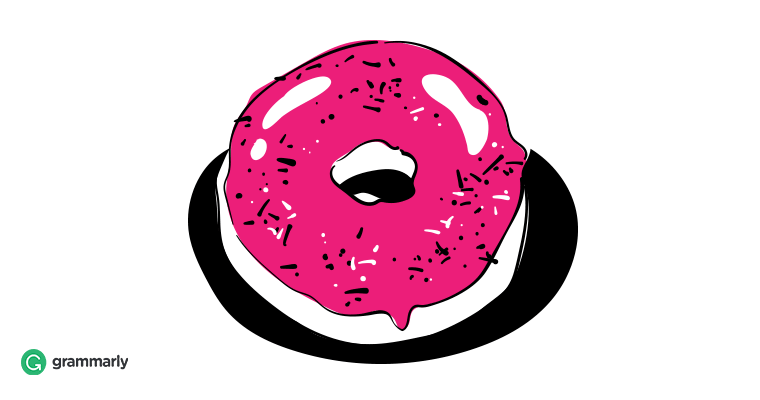Donut is an alternate spelling of doughnut. Some dictionaries point out that donut is rarely used outside the United States. All of them recognize doughnut as the main spelling, as do some of the more popular style guides. Doughnut might be the spelling you should use if you want to be sure you’re not making a mistake.
Doughnuts: the thing no stereotypical law enforcement officer can be seen without. Think of The Simpsons‘ Chief Wiggum. Or, if you’re a fan of looking beyond stereotypes, think of Twin Peaks‘ agent Dale Cooper, who appreciated the importance of doughnuts even though he favored cherry pie and a good cup of coffee. You get the picture—doughnuts have their place in popular culture.
They’ve also been on the mind of nutrition specialists and doctors, who generally advise against eating too many of these sweet and tasty rings of dough fried in oil. But seeing how we’re not the stereotypical girls and boys in blue here, or doctors for that matter, our interest in doughnuts comes from a completely different place. Apparently, there are two ways to spell the word—doughnut and donut—and it’s sometimes not completely clear which of the two spellings is the correct one.

Donut or Doughnut—Which Spelling Is Correct?
The simple answer to this question is they both are. Doughnut is the original spelling, which means it’s the older one, having appeared in the early nineteenth century. If you pick up a dictionary, any dictionary, you’ll find doughnut.
But it’s also very likely you’ll find donut, too. It might be listed as an alternate spelling, and some dictionaries might make it very clear that it’s a spelling mostly used in the United States. Donut, the simpler spelling of the word, first appeared around sixty years after the longer version, and it started gaining traction by the first half of the twentieth century.
Style guides, however, will occasionally list doughnut as the preferred spelling, so it might be better to forgo the shorter spelling unless you’re sure the donut in your writing will not be flagged as a mistake.
Why Is Donut Spelled Two Ways?
What is a doughnut, or donut, if you will? It’s a small lump of dough, which was originally fried in fat. So you can see where the “dough” in doughnut comes from. The “nut” part is actually a different way of saying “a small lump.” Originally, the name of the treat was dough boy.
Donut is a simplification of the original spelling, and as such, it’s completely in the spirit of the American version of the English language. Noah Webster, the godfather of American lexicography, was a strong supporter of spelling reform. If you look at American English and British English today, you’ll see that the former has a strong tendency to prefer the simpler spellings of words.
Lastly, it’s possible to find a correlation between the rise of the simpler spelling and the rise of Dunkin’ Donuts. But while they might get the credit for popularizing it, Dunkin’ Donuts didn’t invent the simpler spelling. In fact, bakeries have been using it since the 1920s.
I'm an enthusiast with a deep understanding of language and its evolution, particularly in the context of American English. My knowledge spans linguistics, lexicography, and language history, allowing me to provide insights into the intricacies of word usage and spelling conventions.
Now, let's delve into the concepts covered in the article:
-
Doughnut vs. Donut: Spelling Variations The article discusses the two spellings of the word: "doughnut" and "donut." Both spellings are considered correct, but "doughnut" is the original and older spelling, dating back to the early nineteenth century. "Donut," a simplified version, emerged around sixty years later and gained popularity, especially in the United States. Style guides may prefer "doughnut," so writers should be cautious about using "donut" to avoid potential mistakes.
-
Usage in Popular Culture The article mentions the iconic association of doughnuts with law enforcement officers in popular culture, citing characters like Chief Wiggum from The Simpsons and Agent Dale Cooper from Twin Peaks. This highlights the cultural significance and recognition of doughnuts as a symbol.
-
Nutritional Perspective The article briefly touches on the advice from nutrition specialists and doctors, cautioning against excessive consumption of doughnuts due to their sweet and fried nature. This adds a health-related aspect to the discussion of doughnuts.
-
Etymology of "Doughnut" Exploring the origin of the term, the article explains that "doughnut" is a combination of "dough" (referring to the lump of dough) and "nut" (indicating a small lump). Originally called "dough boy," the name evolved into "doughnut" with the "nut" element conveying the idea of a small, rounded treat.
-
Spelling Evolution and Noah Webster's Influence The article connects the simplification of spelling, as seen in the preference for "donut," to the historical context of American English language reform. It mentions Noah Webster, a key figure in American lexicography, who advocated for spelling reform. The article draws a parallel between the simpler spelling preference in American English and the rise of Dunkin' Donuts, although it clarifies that the simpler spelling existed in bakeries since the 1920s.
In conclusion, the article provides a comprehensive exploration of the spelling variations of "doughnut" and "donut," incorporating cultural references, nutritional considerations, etymology, and linguistic history to offer a well-rounded perspective on the topic.